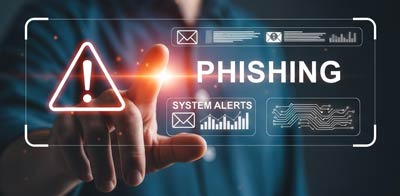
Cybercrime Is Not Relenting
We’re in the middle of a cybercrime epidemic, and it doesn’t look like it’s going to let up anytime soon. Last year the Identity Theft Resource Center Annual Data Breach Report recorded 3,205 cyberattacks, up from 2,365 in 2023. Cybercrime cost the United States an estimated $452.3B last year, not to mention hours, days or weeks to repair the breach — plus the impact of identity theft of employees’ and customers’ personal information.
 As the numbers escalate, so do the types of cybercrime. From phishing to smishing, to vishing, to malware hidden or embedded in files, websites, images, documents, audio files, apps or web ads. Some malware, called ransomware, can take over entire systems, holding them hostage for money. As the numbers escalate, so do the types of cybercrime. From phishing to smishing, to vishing, to malware hidden or embedded in files, websites, images, documents, audio files, apps or web ads. Some malware, called ransomware, can take over entire systems, holding them hostage for money.
It sounds scary — and it can be — but exercising caution, using best risk management practices and staying informed can reduce the chances of a cyberattack. And that’s why we’re stressing cybersecurity training on the 2025 Essentials of Risk Management Form.
 “PDRMA offers three online courses that members can use to fulfill the cyber training requirement of staff for the 2025 RMR,” explains Tim Lenac, PDRMA’s Risk Management Services Supervisor. “The courses cover awareness, prevention and developing good cyber habits. Anyone with access to an agency email and/or a computer should take one of the first two trainings listed below. Staff with access to sensitive or financial information, such as those who work in accounting and human resources, those in the role of Safety Coordinator, etc., should complete one of the first two trainings as well as the third training listed below.” “PDRMA offers three online courses that members can use to fulfill the cyber training requirement of staff for the 2025 RMR,” explains Tim Lenac, PDRMA’s Risk Management Services Supervisor. “The courses cover awareness, prevention and developing good cyber habits. Anyone with access to an agency email and/or a computer should take one of the first two trainings listed below. Staff with access to sensitive or financial information, such as those who work in accounting and human resources, those in the role of Safety Coordinator, etc., should complete one of the first two trainings as well as the third training listed below.”
- CyberSecurity Awareness: This course covers the different types of cyber threats, how to prevent cyber-attacks and the basics of good password security. Who should take it? Any staff with access to an agency email and/or computer.
- Information Security and Cyber Risk Awareness: This course provides a comprehensive overview of key cybersecurity threats and emphasizes the importance of implementing strong security measures to protect sensitive information and mitigate risks associated with cyberattacks. Who should take it? Any staff with access to an agency email.
- Cyber Phishing Prevention: This course covers one of the largest cyber threats: phishing, and how to avoid it. Who should take it? Staff with access to sensitive or financial information, accounting, human resources, Safety Coordinators, executive directors, etc.
For more information about PDRMA’s cybersecurity resources, visit the Cyber Coverage Renewal page of our website. |